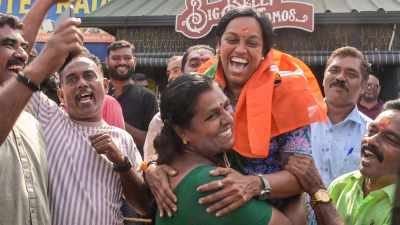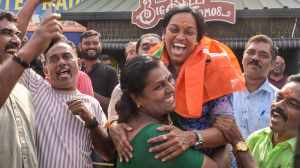Ever since the results of the UPSC CSE 2023 preliminary examination are out, aspirants have been worried about the enhanced difficulty level. Back to basics, questions such as why is it getting tougher to crack civil services exams, why is there still so much ‘craze’ about the UPSC CSE exams, and who is the ‘fittest’ for this exam have resurfaced in the minds of many. Ravi Kapoor, our expert, has some interesting insights…
Manas: What do you think were the real surprise elements in this year’s prelims? How far is the student’s restlessness valid?
Ravi Kapoor: The real surprise in UPSC CSE Prelims 2023 was the overall increase in the difficulty level of the exam. Especially the CSAT, which was far beyond the usual typical level seen in recent years. This is a fact. Having gone through the process and now having mentored many aspirants, I can say this with surety. To truly empathise with the restlessness of the students, we must think about it psychologically. We need to take the aspirations and assumptions of aspirants seriously. The aspirants assume they will be able to answer questions and ace the exam if they work hard enough. They assume that through their effort they can beat the odds and the universe will reward them. But in a situation where the exam is arbitrarily tough and even previously selected candidates fail, aspirants begin to question if their hard work is even worth it.
Some of the surprise elements in this year’s Prelims which increased the difficulty level include the question format and the subject matter of the questions. The CSAT difficulty standards went to a limit where one was bound to ask himself or herself if it was really a Class 10 aptitude level, as UPSC specifies in its syllabus. A prelims paper is not just about knowledge but also how smartly you handle questions. This year’s question paper, however, made all smart techniques like the elimination method of no use. It gave us a sense that standard books may no longer be sufficient. And it appears now that current affairs and static subjects have very little difference in the form of questions.
Having said that, I must mention that the other aspect is equally important to understand. The UPSC exam is competitive and that means it is relative. To clear the cut-off in Prelims, an aspirant does not need to perform their best. They just have to perform less badly than most others. Here comes the role of keeping your anxiety in check and stable temperament. In a situation like the one faced by aspirants in Prelims 2023, one must quickly adjust one’s expectations, give up the ego and calmly focus on minimizing the error rate. Aspirants must remember that if the exam is tough for them, it is tough for everyone. Rather than focusing on obstacles, let’s focus on solutions.
Story continues below this ad
Manas: Every year UPSC has some surprise for students. Seems like ‘unpredictability’ has become a core character of the UPSC exams, not in the form of the pattern but certainly in the form of its question. What do you have to say about these exams changing with time?
Ravi Kapoor: This is an important question that will help me elaborate on what I wanted to say in my reply to the first question. The only ‘constant’ in the universe is change. It seems like the UPSC exams have taken it very seriously. The exam is inherently dynamic because the UPSC must select candidates according to changing times.
A few years ago, there were two optional subjects and no CSAT. These days, there is speculation that the optional subject might be done away with altogether in the future. Many state public service commissions have already removed papers on optional subjects from their syllabus. This dynamism is an integral part of the exam, but it should not deter aspiring candidates.
It is easy to understand when we realise that the UPSC wishes to recruit the best civil servants who can deal with the changing needs of the time for India. There is a close correlation between the UPSC paper pattern and the dynamic challenges faced by the government. The exam changes because of the challenges that India faces. The questions are a testimony to the fact.
Story continues below this ad
The aspirants must understand the following relationship: Experience in the government= Relevance to the job= UPSC paper.
Let’s understand this relationship by taking the environment and ecology as an example. It explains the prevalence of environment-related questions in recent years — India faces the challenge of climate change, global warming, international pressure, and a special vulnerability to environmental challenges being a developing country.
By the way, how many of you noticed that we have already entered the tenth year since UPSC brought up changes in the Mains exams pattern? Now, it will be insensible to assume that UPSC will not up its game for Mains or Prelims since 2013.
Both Prelims and Mains are becoming more dynamic; the mains syllabus has to be covered more systematically and predictably, Ethics is gaining importance and scoring seems to be getting harsher, and Essay topics are getting complex. Agreed. But do we have time and energy to crib? No, accept reality and strategise accordingly.
Story continues below this ad
Manas: So, talking about strategy, how should an aspirant strategise his/her exams preparation with the current dynamism of UPSC?
Ravi Kapoor: Let me give the aspirants some pointers for this question.
1. Keep your eyes and ears open for anything which impacts India or Indians at large.
2. Critical thinking- think for yourself – there is no distinction between subjects in reality.
Story continues below this ad
3. For Mains, do not ignore Essay and Ethics and instead prepare them beforehand.
4. Finish static subjects but don’t assume that your work is done; your practical knowledge about the world must improve.
Example: How is UPI (something we all use in everyday life) linked to the economic growth of India? This feeds directly into the larger question of How technology is being leveraged to meet the overarching goals of the government for inclusive growth and sustainable development.
This is where newspaper reading and reading good sources become important for value-enriching content which can give you an edge in your UPSC exams.
Story continues below this ad
Manas: If we analyse the UPSC CSE current pattern, who is the ‘fittest’ according to UPSC?
Ravi Kapoor: Many aspirants ask me if they are fit for cracking UPSC exams. I tell them that the other way of thinking is whether they are fit for being an officer. The UPSC looks for someone with a robust generalist mindset who can quickly assimilate and work in different types of environments/ministries. Someone who can think as a leader – not only as a citizen. Ability to consume vast amounts of information- detect patterns and problem-solve creatively. Also, someone who can do critical thinking and independent analysis on any topic. One who can summarize and see through the news and events to understand reality. Moreover, someone who is psychologically resilient to stress, and anxiety with a stable temperament. Knowledge and skills can be learned in the process of preparation. It is about having the right attitude towards this service.
Manas: What may seem to you a general question, is one of the most asked for: Why is the UPSC considered as one of the toughest exams in the world?
Ravi Kapoor: It is certainly one of the most popular questions for UPSC. There can be two ways to answer it. Firstly, its vast syllabus and ever-increasing competition. It has an extremely low success rate. But let us go beyond it.
Story continues below this ad
It is psychologically challenging, which I believe is the main reason stress, anxiety, and depression are fairly common among UPSC aspirants. The duration of the exam makes it hard to maintain motivation. It requires a variety of intellectual skills — writing, memorisation, expression, clarity, logical thinking, and more.
There is a significant opportunity cost attached to UPSC preparation. Not only of time and money but what makes it unaffordable for most people is that it may require aspirants to put their careers, marriage, etc on hold, and maybe even forgo other opportunities in life. It requires a significant risk appetite at a relatively young age.
There is a long duration of uncertainty which leads to self-doubt and deflates confidence. To add to all this, peer and family pressures are not less. Even these are the factors that make this exam difficult to not just crack but also to think about appearing for it.
Manas: But if that’s the case, why is there still so much ‘craze’ about the UPSC CSE exams?
Story continues below this ad
Ravi Kapoor: Service to the country, contributing to the growth of the nation, etc. are some ethical and moral dimensions of what a lot of aspirants will tell you. Ideally, that should be the case.
It is also important to see the other side of the coin. We inherit the legacy of power and elitism of the British Raj. This is best reflected in bureaucracy. Even after so many years of Independence, we have not been able to come out of the hangover of status, power, and prestige. Social hierarchy in our country places bureaucrats above other professionals. Then there is definitely the economic factor. We are still a developing country and thus government jobs are seen as avenues for social and financial security.
Recently, with social media in vogue, glamour, and fame are also seen as attached to this service.
However, why one should opt for this service should have an ethical dimension. But are the aspirants investing the most important years of life and are ‘crazy’ about it for ethical reasons.. that is the ‘point to ponder’.
Dear Aspirants,
Thank you for joining us for LIVE sessions. Every day we receive your emails and messages, in large numbers, with queries revolving around news and UPSC preparation in general. Each letter and text makes us feel that we need to do more to simplify your examination preparation journey. You will be happy to know that we will be LIVE every week on Wednesdays, take up your queries, provide you with cues from the news, and discuss a relevant theme revolving around news and UPSC preparation in general.
You can send your queries to manas.srivastava@indianexpress.com or join Telegram: The Indian Express UPSC Hub or ask us Live!
(The UPSC Essentials Indian Express is now on Telegram- Indian Express UPSC Hub. Click here to join our YouTube channel and stay updated with the latest updates.
Note: Catch the UPSC Weekly Quiz every Saturday evening and brush up on your current affairs knowledge.)


































